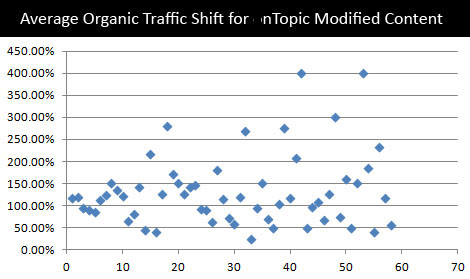Today Virante, Inc. launched nTopic, a content relevancy scoring API for Search Engine Optimization. Because there is nothing quite like it available in the world of SEO, we thought it would be appropriate to spend a little bit of time explaining what nTopic is and does.
What is Content Relevancy Scoring?
Most on-page optimization techniques, historically, have relied on simply finding more and more places to shove your keywords. First, it was the title tag. Then the meta description, the meta keywords, the content, the H1 tag, so on and so forth. While these are all well and good, each step had depreciating levels of return on investment and created content that was keyword-stuffed. What Google really wanted from you was simply to write good, relevant content.
So what is “relevant” content in the eyes of a search engine. Luckily, we can look to statistics to answer that question. A long known technique for determining topical relevancy is called Latent Dirichlet Allocation. Simply put, LDA allows you to determine if one piece of content is topically similar to another. This means if we have a keyword, we can create an ideal piece of content and then compare it to yours to determine if it is relevant. SEOMoz first discovered a correlation between LDA and rankings back in 2010 but chose not to pursue it at the time as they began to roll out their incredible OpenSiteExplorer and other technologies.
What is nTopic?
We took SEOMoz’s lead and, over the last 1.5 years, have developed our own model, based in large part on LDA, to help score content on a 0 to 100 scale of topical relevancy. We call this score nTopic. Ultimately, you want to score a 99 or higher on topical relevancy for your primary keywords. For math nerds out there, nTopic is actually the confidence interval that you are topically related to the keyword.
nTopic is an API that accepts a keyword and a piece of content. We then return the relevancy score, a simple A to F grade, and if you are a paid user we return keywords you should include and/or remove in order to improve the relevancy of your content.
When you register with nTopic, you receive a free API key which can be used to power the Chrome Extension, WordPress Plug-in and Standalone Writer. However, you can expect over the weeks and months to come that more and more SEO tools will begin to incorporate nTopic’s API into their offerings.
Why Should I Care?
Simply put, nTopic is the first new on-page technique in years to be statistically proven to increase organic traffic. We have the studies to back this claim. Every piece of content you produce for the web should be topically relevant to the keywords for which you would like to rank, and nTopic offers you that opportunity. You should be able to answer the question: Is your content on topic?
 Moreover, nTopic can be used in creative ways to determine things like the relevancy of the pages that link to you or the overall relevancy of your anchor text profile.
Moreover, nTopic can be used in creative ways to determine things like the relevancy of the pages that link to you or the overall relevancy of your anchor text profile.
How Do I Get Started?
Simple. Just visit nTopic.org to sign up and receive your free API key. You can use this key in the Chrome Extension, Writer or WordPress Plugin found on the tools page. If you upgrade ($10/mo), you will not only receive your relevancy scores through these tools, you will also receive keywords that you should add or remove to increase your relevancy.
Final Thoughts
Just 2 days ago, James Norquay interviewed a former member of Matt Cutts’ Search Quality Team and said “Relevancy is the new PR”. If he is correct, then you need to begin answering the question of exactly how relevant your content is. nTopic is the way to score content relevancy.


I’ve learned a lot in your post. Thanks very much.
I always follow your post because there are full of compelling information about various things.